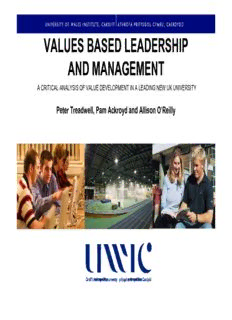
Powerpoint PDF
Preview Powerpoint
VALUES BASED LEADERSHIP AND MANAGEMENT A CRITICAL ANALYSIS OF VALUE DEVELOPMENT IN A LEADING NEW UK UNIVERSITY Peter Treadwell, Pam Ackroyd and Allison O’Reilly Introduction Value-based leadership – reality or rhetoric? Theoretical ‘base’ - a critical management approach [Fulop and Linstead, 1992, 2004] Values - • offer organic growth • ‘seen’ as key words/short phrases – i.e. - “together we ensure openness, accountability and trust” • Build emotional power and attachment • modelling and operationalisation Introduction [2] The value statements a university constructs speaks volumes about its organisational culture Procedural underpinning, modelling and positive “story-telling” builds value alignment [Johnson, 1987] Conflict based around interpretation - improving understanding and organisational learning [Murlis and Schubert, 2001] Executive ‘buy-in’ essential - and not the ideal and the pragmatic [Johnson and Scholes, 2002] Context - UWIC Leading ‘new university’ in Wales, UK [ 10,000+ students] Vocational academic portfolio; niche market applied research Major academic re-structuring in 2004 to 2006 – 5 ‘Schools’ New Strategic Intent and Corporate Plan + ‘balanced score-card’ Commitment to value-based leadership and management Identification of emotional selling points [ESP’s] and building ‘brand’ Context - UK Evolving agenda linked to leadership, management and governance in HEIs – i.e. – Leadership Foundation for Higher Education [2003] Few [critical] management research studies of UK HE – exceptions – Jarratt Report [1985]; Middlehurst [1991]; Lambert Review [2003] Leadership ‘summit’ [ December 2004] – LF for HE – identified 15 strategic challenges for UK HEIs ….. ‘leadership effectiveness’ NOT mentioned “Vice Chancellors need good general leadership qualities. This means a real and successful effort to engage with and understand academic values and practices….and so far only a handful of people have managed it.” Roger Brown CEO Southampton Solent University, Times Higher, Aug 06 The values-building process ‘Learning journey’ to values creation – HRM training ‘away’ days Value alignment to performance management and ‘brand building’ Process – • 1 to 1 interviews with senior managers [n=21/27] • Core values and behavioural ‘standards’ transcribed • Leadership development residential – 18 value statements • External scrutiny [Office for Public Management] • 6 final core values and an underpinning ‘ethos’ • ‘Strategic Intent and Direction’ statement Research perspective Focus – unconditional giving and ‘discretionary effort’ Research perspective [2] Organisational Culture Organisational culture is often a ‘filter’ of members’ perceptions of leadership, leadership development and change management [Taguiri and Litwin, 1968] ‘Levels’ [L] of organisational culture - L1 –artefacts; L2 – values; L3 – basic assumptions [Schein, 1985] Management policies and leadership practices - build mutual trust? “How things are done around here” [ Rentsch, 1990 ; Atkinson, 1990] Culture - collegial; consensual; hegemonic power distribution? [Bush, 1989] Research perspective [3] ‘new’ UK university culture Modern tensions – increased professionalism; market and consumer choice; commercialism Erosion of old ‘core’ values of trust, commitment, community, equality, freedom Move to more ‘instrumental’ values – • ACADEMIC – independence; impartiality; competence • LEARNING – reflection; self understanding and empowerment • SOCIAL – citizenship; tolerance; betterment • MANAGEMENT – efficiency; accountability; transparency [Robinson et al, 2004] Research perspective [4] Political ‘modelling’ of HEI leadership Political ‘model’ of framing UK ‘new universities’ HEI leadership – based upon the use of – • power and conflict in management decision-making • The critical paradigm for understanding interplay between organisation and the individual • Hegemonic leadership and empowerment -‘cultural battlegrounds’ [Van Kippenberg and Hogg, 2003]
Description: